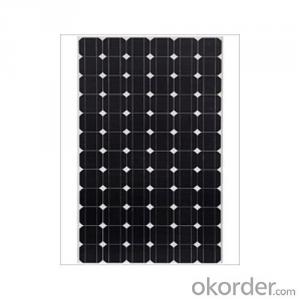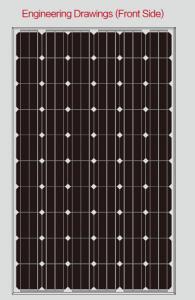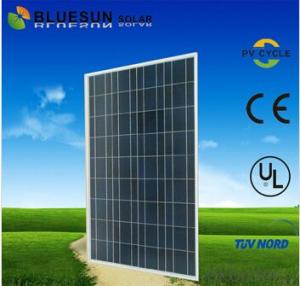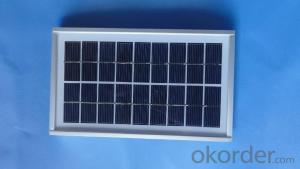Solar Monocrytalline 125mm Series (120W-----130W)
- Loading Port:
- Shanghai
- Payment Terms:
- TT OR LC
- Min Order Qty:
- 1000 watt
- Supply Capability:
- 20000000 watt/month
OKorder Service Pledge
OKorder Financial Service
You Might Also Like
Item specifice
1.Description of the Solar Module
Solar Monocrytalline 125mm Series (120W-----130W)
The making craft of polycrystalline silicon solar panels with monocrystalline silicon solar panels is similar, but the photoelectric conversion efficiency of polycrystalline silicon solar panels to reduce a lot, the photoelectric conversion efficiency is about 12% (on July 1, 2004, Japan's sharp market efficiency for 14.8% of the world's highest efficiency of polycrystalline silicon solar panels). In terms of production cost is cheaper than monocrystalline silicon solar panels, material is simple, save power consumption, the total production cost is low, so get a lot of development. In addition, the service life of the polycrystalline silicon solar panels is shorter than monocrystalline silicon solar panels. As for the price performance ratio, monocrystalline silicon solar panels is slightly better.
2.Characteristics of the Solar Module
Max Power Voltage Vmp (V) | 18.0 | 18.2 |
Max Power Current Imp (A) | 6.67 | 7.14 |
Open Circuit Voltage Voc (V) | 22.6 | 22.8 |
Short Circuit Current Isc (A) | 7.08 | 7.60 |
Max Power Pm(W) | 120 | 130 |
3.Limits of the Solar Module
Operating Temperature | ﹣40℃to+85℃ |
Storage Temperature | ﹣40℃to+85℃ |
Max System Voltage | 700V |
4.Specifications of the Solar Module
Power | 120W/130W |
Dimension | 1060x820x30mm |
Weight | 10.3kg |
Tolerance | ±3% |
The dimension of the modules can be changed according to the demand of clients
5.Guarantee of the Solar Module
Products Guarantee | 2 yrs free from defects in materials and
workmanship |
Performance Guarantee | No less than 90% within 10yrs and no less than 80% within 20yrs |
Certificates | IEC,ISO,TUV,CE |
6.Applications of the Solar Module
1.Electricity
2.Heat energy
7.IMages of the Solar Module
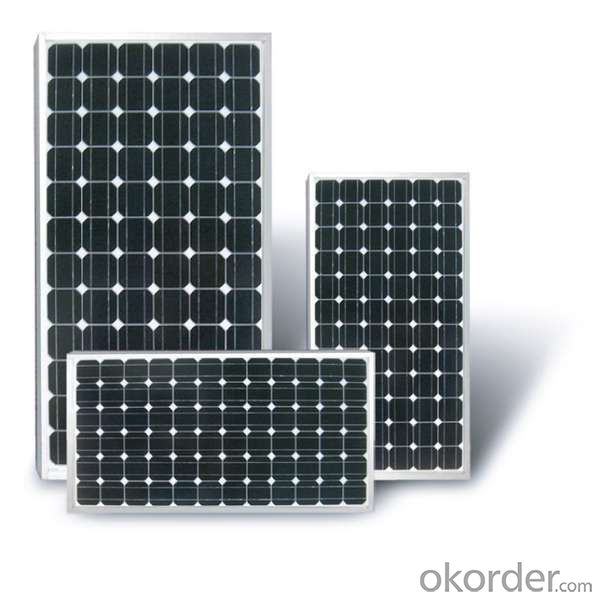
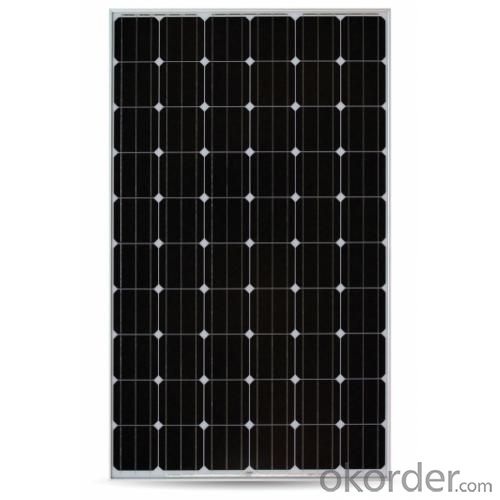
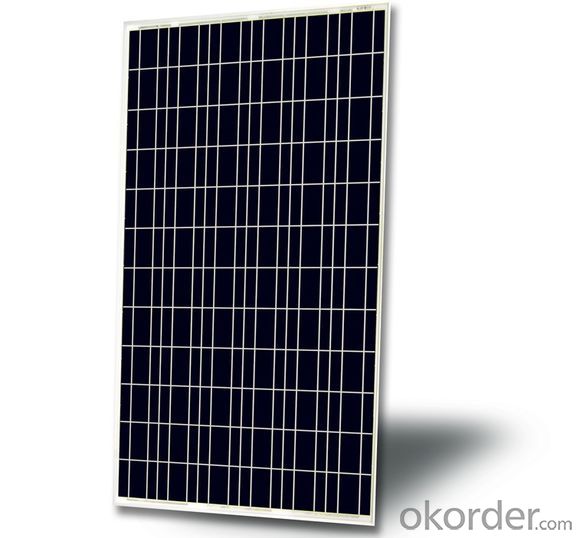
FAQ
1. Q: Do you have your own factory?
A: Yes, we have. Our factory located in Jiangyin city, jiangsu province.
2. Q: How can I visit your factory?
A: Before you take off from your country, please let us know. We will show you the way,or arrange time to pick you up if possible.
3. Q: Do you provide free sample?
A: Usually we do not offer free sample
4. Q: Could you print our company LOGO on the nameplate and package?
A: Yes, we can do that.
- Q:Do solar panels require a backup generator?
- No, solar panels do not require a backup generator as they generate electricity directly from sunlight, eliminating the need for external power sources.
- Q:I don't see much solar panels on people's houses where I live. I got a long time to go before doing so but I was planning on buying a few solar panels when I retire in the far future. In your opinion, is such an investment worth it? Would you buy them? I realize they are very expensive hence why I said when I retire. Thanks for your opinion
- You ask a great question, because this should really be a financial decision, and not only an environmental one. Depending on which state you live in, the payback on a system is often in the 5 to 2 year range. The great thing about solar panels is that the fuel source is free and you don't need to speculate on your future costs. You pay for the equipment up front, and then you just enjoy the free power. Most solar panel systems last at least 30 years, so compare the cost of solar panels to paying your average electric bill 360 times. And that does not include any inflation of energy cost increase. Check out our website to learn more.
- Q:I would love to put in solar panels on my roof, but how hard would it be, and how expensive? Would I be able to do the work myself, or would I have to hire a pro?Also I live in Oregon, so much of the time it is overcast, so would it really be worth it?
- Not a good idea. The reason why panels are that much more expensive than cells is that the panels themselves are not that cheap either. If you start with the cells, you'll need - mechanical protection (hail, ice, snow) - electrical protection (i.e. waterproofing - if water comes in contact with the cells and wires, you'll get electrolysis which will corrode your wires and contacts faster than you can say 'b*mmer') - that setup will need to withstand temperatures between -20 and +30 °C (only guessing, might be worse) - oh, and the side facing the sun must be transparent (as far as possible) Now as to connecting the stuff: no, it will be neither easy to connect it to the house power nor to the grid - which is why that step (at least) in all countries I know of must be done by a certified electrician. If you get it wrong and you're lucky, only _your_ inverter will explode. Regarding the power: these 4W per cell (or kW for your shed) is the peak value, i.e. with the sun shining orthogonally onto the cells on a clear day. Since this (for a fixed installation) will only be true (at most) for a few minutes on a few days each year, your overall yield will be significantly less, probably more like 4 kWh/day for each clear day for each kWpeak you install _IF_ the shed roof is oriented exactly south and inclined towards the sun's noon position at the spring/autumn equinox (i.e. inclination angle = your geographical latitude). How many clear days do you have in britain? Yes, I had a similar idea for myself - but for one thing, the registered companies I addressed apparently weren't really interested in that small fry, plus the cost of the system + setup would barely have been amortized after the expected lifetime, even taking into account the (german) governmental subsidies. If I had the money to spare, I'd rather invest in a communal solar park. Much better ROI, the large installations get much better prices (per kW) for the setup.
- Q:Photo-Voltaic solar panels are very expensive. Most of a home's energy needs are for heating water, heating and air-conditioning. All of these can be met with thermal solar collectors which are much less expensive. The thermal solar panels would heat water stored in a hot water tank which then can be used as hot water, to heat the home, or as the heat source to a Lithium Bromide Absorption chiller to air-condition a home. With the base line needs met without expensive panels and without inefficient energy conversions, only a small Photo-Voltaic array would be needed for the remaining power needs and since those needs are variable, there would still be power to sell to the grid.
- That sounds good to me. I'm all for any kind of new energy as long as it's renewable and doesn't pollute the environment. I'm even a fan of solar water heating.
- Q:Are solar panels a good investment?
- Yes, solar panels are a good investment. They provide long-term financial benefits through reduced energy bills, potential tax incentives, and increased property value. Additionally, they contribute to a cleaner environment by reducing reliance on non-renewable energy sources.
- Q:Do solar panels float?
- They'll float if you tie enough hundred dollar bills to them.
- Q:Can solar panels work in the shade?
- The okorder / All solar panels sold by Energy Matters have bypass diodes, which send output from the remaining cells around that dead cell. However, you have lost the output of that cell, so the total panel voltage will drop by about 0.48 volts per cell. Most panels are in the 6 to 8 volt range, and most batteries need at least 3.5 volts to charge completely. So, if 2 or more cells are shaded, the output voltage of the panel may drop too low to charge the battery.
- Q:Can solar panels be used in areas with high levels of snowfall?
- Yes, solar panels can be used in areas with high levels of snowfall. However, the efficiency and performance of solar panels may be reduced during snowy conditions due to reduced sunlight exposure. Regular snow removal and tilt mounting options can help mitigate the impact of snow accumulation and ensure optimal energy production.
- Q:this solar panel i saw was for 500 dollars(i get a 25% discount)and i was curious will they produce electricity? or just heat?what do they do?is it a good investment?here is a link to the one i would like, no reviews but it looks new to the site.
- This is a photovoltaic panel...it produces electricity from incident solar radiation. Solar thermal panels produce heat, and they are usually assists for hot water heating systems. Solar thermal panels have piping in them instead of semiconductor cells like photovoltaics do.
- Q:Can solar panels be installed on theme parks or entertainment venues?
- Yes, solar panels can be installed on theme parks or entertainment venues. In fact, many theme parks and entertainment venues around the world have already embraced solar energy as a sustainable and cost-effective solution. By installing solar panels, these venues can generate their own clean energy, reduce their carbon footprint, and save on energy costs in the long run.
1. Manufacturer Overview |
|
|---|---|
| Location | |
| Year Established | |
| Annual Output Value | |
| Main Markets | |
| Company Certifications | |
2. Manufacturer Certificates |
|
|---|---|
| a) Certification Name | |
| Range | |
| Reference | |
| Validity Period | |
3. Manufacturer Capability |
|
|---|---|
| a)Trade Capacity | |
| Nearest Port | |
| Export Percentage | |
| No.of Employees in Trade Department | |
| Language Spoken: | |
| b)Factory Information | |
| Factory Size: | |
| No. of Production Lines | |
| Contract Manufacturing | |
| Product Price Range | |
Send your message to us
Solar Monocrytalline 125mm Series (120W-----130W)
- Loading Port:
- Shanghai
- Payment Terms:
- TT OR LC
- Min Order Qty:
- 1000 watt
- Supply Capability:
- 20000000 watt/month
OKorder Service Pledge
OKorder Financial Service
Similar products
New products
Hot products
Related keywords
